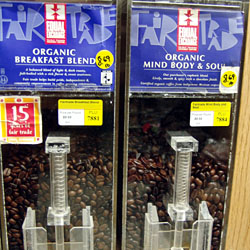
Supporters of a push to serve fair trade coffee at dining facilities in the U.S. House of Representatives declared an initial victory as the firm that manages food services prepares to begin offering taste testing of the coffee as early as next week.
The request for the switch came from more than 60 House members, led by Congressmen Sherrod Brown (D-OH) and George Miller (D-CA), who urged Starbucks and the company that manages food services for the U.S. House and other institutions in Washington, DC, Maryland and Virginia to sell a fair trade blend that gives a real return to the farmers who grow it while preserving the flavor coffee drinkers have come to expect from the popular brand name drink.
The contractor, Guest Services, sells over 300 pounds of brewed Starbucks coffee each week in its House of Representatives operations alone. The surveying and taste-testing will be on Thursdays in a coffee shop in the Longworth office building. Guest Services will evaluate customers' reactions to the new blend and make a final decision on whether to replace the standard Starbucks House blend with the fair trade blend.
"Thanks to Guest Services' responsiveness, coffee drinkers will have the option of starting their mornings in a socially responsible fashion. This is good news for small farmers, the environment, and the entire House," Brown said.
"Regular consumers of Starbucks coffee will be pleasantly surprised to find that coffee sold in a socially responsible manner tastes just as good as the "unfair: blend," said Miller. "We appreciate Guest Services's continued cooperation on this issue."
Staff from Miller and Brown's offices met last week with executives from Guest Services and Transfair USA, the non-profit company that certifies and promotes the fair trade imports from 21 countries around the world.
Farmers who grow fair trade certified coffee earn $1.26 per pound, four times the amount as farmers who sell their coffee through conventional trading mechanisms, receiving between $0.20 to $0.30 per pound for their coffee.
In their letter to Guest Services Director Elizabeth Stankewich, sent earlier this week, the lawmakers wrote, "We believe that our Congressional staffers and employees should have the opportunity to purchase Fair Trade Certified coffee in our office buildings so that they can be sure that the farmers who grew their coffee were compensated fairly... We believe that Fair Trade Certified coffee offers a successful, market-based approach to ensure workers in developing countries share in the benefits of globalization." The lawmakers wrote that it is likely that the benefits of the switch to fair trade coffee would come at little if any cost to consumers, perhaps as little as one cent per cup of brewed coffee in House restaurants and coffee shops.
In addition to its economic benefits for farmers, fair trade certified coffee offers environmental benefits as well. A larger percentage of fair trade coffee is shade grown, reducing the incentive to clear cut new tracts of land to grow more coffee. In addition, fair trade coffee growers are paid a premium by purchasers if they grow organic coffee.